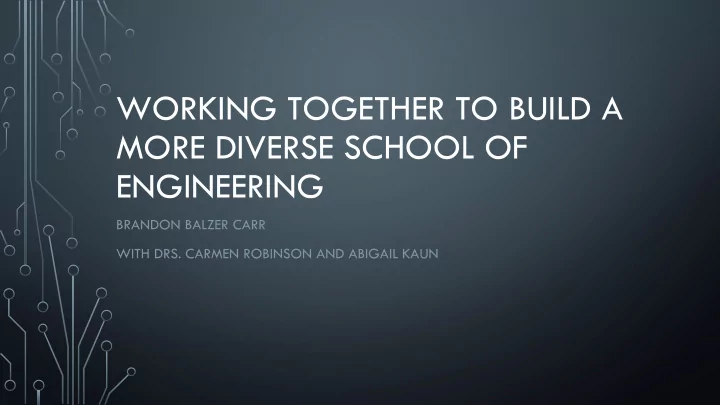

WORKING TOGETHER TO BUILD A MORE DIVERSE SCHOOL OF ENGINEERING BRANDON BALZER CARR WITH DRS. CARMEN ROBINSON AND ABIGAIL KAUN
WHY ARE WE STUDYING DIVERSITY IN THE BASKIN SCHOOL OF ENGINEERING? • The SSERC was contacted by administrators in the BSOE • Dr. Carmen Robinson, Dean of Undergraduate Affairs • Dr. Abigail Kaun, Special Assistant to the Dean • They noticed racial/ethnic homogeneity in the division • They had heard anecdotes about students of color, low-income students, and women struggling in the division • They were worried that under-represented students were under-supported
WE DECIDED TO CONDUCT A STUDY! • Mixed-methods study of the Baskin School of Engineering • Statistical analyses of university student records to assess demographics, major declaration, retention and graduation, and course performance • Interviews and focus groups with underrepresented students in the division to allow them to explain why their peers leave or underperform • Large-scale survey of all students in the division to rigorously test hypotheses derived from interviews and focus groups • A collaboration between SSERC and the BSOE
INSTITUTIONAL RECORD ANALYSIS • Official academic records of all UCSC students • 2005 through 2018 • Databases: AIS-Daily, Student Universe, Cohort Universe • Statistical analyses using SPSS
THE NUMBER OF STUDENTS IN THE BASKIN SCHOOL OF ENGINEERING HAS QUADRUPLED IN TEN YEARS
THE NUMBER OF STUDENTS PROPOSED SOE AT ENTRY HAS LIKEWISE GROWN DRAMATICALLY
DECLARATION RATES HAVE ALSO GROWN, AND THEY HAVE COINCIDED WITH INCREASING EQUITY GAPS
DECLARATION RATE GAPS PERSIST BETWEEN MEN AND WOMEN AS WELL IN THE SOE
WOMEN EARN BETTER GRADES IN THE SOE
SO WHY DO STUDENTS LEAVE? WHY DO WE SEE GAPS BETWEEN GROUPS? • We conducted interviews and focus groups to let students answer these questions • Focused on challenges they experience, why they decided to become and engineer, family relationships, classroom interactions, office hours, academic advising • Recruited from organizations that support underrepresented students • NSBE, SHPE, SWE, and the DRC • Thirteen interviews/focus groups with twenty total students • In-depth, semi-structured, 1-2 hour, audio recorded, transcribed • Preliminary deductive themes
ACADEMIC PREPARATION AND LACK OF SUPPORT My first two years were really hard because I didn’t have a community. I was trying to get through engineering, but I didn’t have anyone to guide me. So I was kind of like winging everything, and I tried to get help where I could get help, but I just didn’t feel comfortable at times asking for help. A lot of students in my classes were really advanced. I was competing with them, but I came from a high school where there wasn’t any science education. I went to high school by the border, so we didn’t have physics classes. I was not prepared for college. I came here, and it was a slap in the face.
LACK OF INSTRUCTIONAL TRAINING I would definitely like there to be a push for training the TAs before they take a class. Again, I find it kind of absurd that I was tutoring for a specific program, and it was only a few students that I was tutoring per week, and still I had to be there. There were orientations I had to attend before the school started, there were weekly meetings, and these TAs are tutoring somewhere between 30 to 100 students, and the fact that there is no sense of training or anything like that. I think it’s quite unfair to the students, and in a way unfair to the TAs as well.
ROLE MODELS It was a big culture shock coming here actually ‘cause I did Black Academy to start, and it was really good for me to see so many African Americans that are really on their goals and trying to accomplish great things in life. ‘Cause where I’m from there are a lot of African Americans, but not a lot of them are focused. It’s harmful to the character to every other week see Black people get arrested for fighting or something like that… I feel like it’s one of the major issues with the STEM major for sure. There’s not a lot of Black role models, so it’s hard to picture yourself in a position of power and success when you can’t see someone like you in that position ever.
GATE-KEEPING AND STEM ELITISM So I had a professor here on campus tell me like—I went up to him after class, and I told him, “hey, I’ve been having some medical issues and I’ve been behind. How do you advise for me to study for this class more effectively? Should I just look over your lectures? Should I read the textbook, or should I—what’s the best approach to catch up?” And I really remember this because I only asked for advice. I didn’t say, “excuse my homework,” even though I low-key could have asked for that. I have the right to ask him for an extension. I didn’t. I never asked for that. I asked for advice and he said, “my advice is that if you’re already asking me for how to catch up right now—it’s a starter course. You’re not made for this major. You should really just find something else.
SUGGESTIONS • Expand summer bridge and ensure curriculum alignment with core PLOs • Comply with ADA mandated DRC accommodations • Participate in CITL professional development programs • Graduate Certificates • STEM Teaching & Learning Communities • Transforming STEM Teaching - Faculty Learning Programs • Offer more peer mentorship opportunities • Adopt a growth a mindset
THANKS! • Carmen Robinson and Abigail Kaun • Sam Rosloff, Josh Teso, Aaron Roldan, Brenda Diaz, Sarahi Godinez, Leanne Grace Novo, & Christy Koyabu • Becca Covarrubias and Sam Foster • Question: What else can we do to increase diversity in the BSOE?
Recommend
More recommend